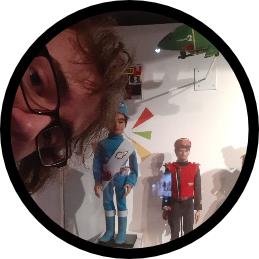
Hello and welcome back to the Big Who Listen! We’re here to listen to and talk about the Doctor Who audio dramas produced by Big Finish, and have some fun along the way.
The hunt for the Key to Time segments goes on, but with no sign of it anywhere in the universe, it’s not just the Doctor who’s starting to get desperate…
The Destroyer of Delights is available to download for £7.99 here.
“You will be always looking in the wrong place. I have searched through all of Time and I cannot find it.”
The search for the Key to Time has stalled: the next segment does not appear to exist anywhere in the Universe. Forced into a temporary alliance with one of his greatest enemies, the Doctor suggests a course of action that is a validation of chaos itself.
Thrown at random across Space and Time, the Doctor and Amy arrive in 9th Century Sudan, where the greedy Lord Cassim is hoarding gold from the Legate of the Caliph. But why does Cassim look so familiar? What is the mysterious Djinni that lives out in the desert? And why does it need so much treasure?
John Ashway

Following on the cliffhanger of the last story, the Doctor and Amy are faced with the Black Guardian – and this episode gets off to a great start with a radically different take on the character. Changing the guardians’ conflict from one of good vs evil to one or order vs chaos lets the Black Guardian play nice for a while, and David Troughton makes him untrustworthy but a little likable fellow (though he can change on a dime). It’s an original, interesting reimagining. Jumping a little ahead, Jason Watkins is also great as the White Guardian, now a bureaucratic, small busybody clinging to the rule of law. These two characters are this story’s great strength, they’re funny and played by real pros. Some may balk and making the guardians figures of fun, but if we’re to spend extended time in their presence, they needed more personality than stock good and evil archetypes.
Unfortunately, this story isn’t just about locking the Doctor and the guardians in a room to have it out. The Doctor and Amy are sent to 9th century Sudan and separated. Amy is found in the palace and taken for a slave, but more disappointingly her personality has regressed, desperate for instruction from anybody and completely naïve again. Is the idea that separating from the Doctor has caused this? If anything, she’s even less street-smart than when she started. Ciara Janson continues to put as much charm into Amy as possible but this is quite frustrating stuff.
The setting is a little confused, as the story can’t decide if we’re going for a genuine historical location, or the city of Agrabah. There are constant references to Arabian myths and legends, and a generally white-washed, fantastical vibe. Sure, Amy may be a slave, but being a slave isn’t that bad. The Prince is good, really, as he orders her about. And Nisrin, Amy’s senior, only means well when she slaps her, and threatens her with awful punishments. I hope I’ve drenched this in enough sarcasm that it drips off the screen.
The actual bare bones of the story could easily fit into 45 minutes – Lord Cassim (the Black Guardian) is hoarding all the gold and taking it into the desert rather than paying his taxes, his son and the White Guardian want to find the gold. But there’s a lot of chatter and back and forth to drag things out.
It’s a shame, because I do think as a whole this is better than The Judgement of Isskar – it’s more focused and coherent, doesn’t feature annoying insect people, and two great guest stars do their best to bolster it. But it’s still not at the level where it should be. Can the finale rescue the series? Hmm, I’m not expecting much, I’m afraid.
James Ashway

Four segments into the Key 2 Time trilogy, it’s tempting to think that a lot has happened. And it’s true, the Doctor and Amy have visited a few planets and a spaceship as part of their quest so far. But these were all fleeting visits, as part of a story that never really came together. It shouldn’t really be that hard, therefore, for The Destroyer of Delights to really give this trilogy a bit of a boost. Unfortunately, that’s exactly what it doesn’t do.
To give credit where it’s due, the story gets off to a pretty good start. After the climactic cliffhanger with the Black Guardian at the end of The Judgement of Isskar, the Doctor and Amy find out that he’s not a bad guy – sort of. David Troughton’s portrayal of a new aspect of the Black Guardian, as a kind of evil Del Boy who’s only trying to lighten things up and bend the rules a little, is a big success, and makes the opening 10 minutes or so of the story a really interesting prologue. Similarly, the asides with the Black Guardian and the Legate of the Caliph later in the story are also a delight – it’s just a shame the rest of the story couldn’t live up to the same standard.
Instead, The Destroyer of Delights is mostly an Arabian Nights-style tale with a Doctor Who spin, and not a particularly original one at that. The setup presents it as vaguely historical, but it’s nothing of the kind. There’s nothing particularly real about the story itself, and it’s not really trying to engage with any historical aspects of ninth century Sudan. That’s not necessarily a problem, of course, but it would have given the story a bit of flavour rather than being the reheated leftovers of a variety of all manner of similar tales. The Doctor and Amy do their best to try and keep the plot moving, but it’s quite the struggle.
Ultimately, The Destroyer of Delights is just a pretty dull story. There’s not really a lot to say about it, except that it’s drawn out and doesn’t live up to its original promise. It stands as a warning to anyone considering naming their adventure The Destroyer of Delights or similar unless they’re certain it’s a hit – otherwise, the jokes just write themselves.
Sam Sheppard
After Big Finish’s Key 2 Time trilogy got off to a shaky start with Simon Guerrier’s The Judgement of Isskar – an uneven story in which not much actually seemed to happen with Isskar and his judgement – the trilogy continues with Jonathan Clements’ The Destroyer of Delights. Unfortunately, this particular story isn’t really much of an improvement on the previous one. For one thing, The Destroyer of Delights continues the trend of titles that seem weirdly unfitting: you might think this Destroyer of Delights is an actual being that you’re going to encounter in the course of the story, but no, apparently it’s just an euphemism for death, a word which the side characters refuse to speak aloud for some reason. (And frankly, by the end of the story, I was heartily sick of hearing the phrase “whose name cannot be spoken”).
However, The Destroyer of Delights has much bigger issues than that, starting with the initial set-up. The story picks up right where The Judgement of Isskar ended, with the Black Guardian appearing to save the Doctor and Amy from a fiery demise; we then discover that nobody has any idea where the next segment of the Key to Time could be, and so the Black Guardian deposits the Doctor and Amy in one of the areas where he thinks the segment might be. The problem here is that, consequently, The Destroyer of Delights lacks the usual narrative drive of “all right, we know roughly where the segment is, so how do we retrieve it?” Instead, the story just sort of aimlessly meanders along, with the main characters and the listener hoping that the segment will turn up at some point.
That lack of forward momentum would be less of an issue if the main storyline here was a good one, but unfortunately, it isn’t. It seems as though Jonathan Clements was aiming for a light-hearted, entertaining romp; however, nothing that happens in The Destroyer of Delights is particularly fun or interesting, which means that this whole story is just a bit of a chore to get through. On top of that, the story is set in 9th century Sudan, with Clements drawing upon Arabic folk tales for inspiration (specifically, this story is a Doctor Who version of “Ali Baba and the 40 Thieves”). It often feels a bit dubious when Doctor Who cribs from non-Western cultures in this way, and it definitely doesn’t help when (as often happens with Big Finish) we have people of colour being voiced by white actors.
In the midst of all this, we have the Black and White Guardians, who have effectively been stripped of their powers due to the ongoing crisis, and are being reduced to the level of ordinary, mortal beings. In fact, they actually spend decades playing the roles of human rulers – a slightly odd plot beat which leads me to suspect that Clements already had the whole storyline planned out in his mind when he was asked to add the Guardians, and so he just took the low-effort route of having them replace two of the side characters. There’s also the issue that Clements tries to use the Guardians as a source of comic relief, but none of it works; there’s nothing particularly funny or engaging about hearing the de-powered Guardians whinge and squabble with each other, and it’s just another of the many issues dragging down The Destroyer of Delights.
On the whole, The Destroyer of Delights reinforces the fundamental problems with Big Finish’s new Key 2 Time storyline. Compared to the previous Key to Time arc, Big Finish has tried to raise the stakes by having a more serialised storyline and introducing the idea that the whole universe is under threat because the segments are decaying. If you’re going to do that, though, you have to actually commit to the idea and furnish your stories with a real sense of urgency and tension. So far, Big Finish hasn’t been able to do that – and it definitely doesn’t help that The Destroyer of Delights just brings the whole storyline to a screeching halt so that we can indulge Jonathan Clements’ interest in Middle Eastern culture. Maybe The Chaos Pool will be able to pull a win out of the bag and turn this whole trilogy around, but I think we’ll all be very surprised if it does.
Adam Kendrick

Okay, maybe I was slightly too optimistic when I ended my review of The Judgement of Isskar by hoping that the rest of the Key 2 Time trilogy would be more satisfying. After starting with an uneven but passable origin story for the Ice Warriors, The Key to Time 2: Judgement Day takes a dive into mediocrity with The Destroyer of Delights. With four segments in the bag (or rather, Amy’s satchel), the hunt for the fifth segment begins, which is made trickier by the fact it doesn’t appear to exist anywhere in the universe. With no alternative ideas, the Fifth Doctor and Amy take a random leap of faith and end up in 9th Century Sudan – and if you haven’t guessed that the premise of this audio is “Doctor Who does Ali Baba and the Forty Thieves”, the random references to the number 40 in the dialogue might tip you off.
As writer Jonathan Clements explains in the CD Extras, he loves dabbling around in obscure periods of history and ultimately decided to give the legend of Ali Baba a science-fiction twist: in his version, Lord Cassim is hoarding gold so he can repair a crashed spaceship in the desert, which is about as uninspired as it sounds. While the amount of Arabic terminology in the script indicates that Clements did his research, you can’t help but feel that The Destroyer of Delights is treating Arabic folktales in the same way as how the abysmal Dreamtime treated Aboriginal Australian mythology – to quote our Sam, these stories repurpose non-Western cultures “as a toybox full of interesting concepts with which to enliven the narrative”. There’s further discomfort upon hearing these ostensibly Arabian characters speaking in perfect British accents (although the CD Extras reveal that director Lisa Bowerman initially auditioned some actors with Middle Eastern accents but thought it “sounded too much like Carry On Up the Khyber”, so perhaps we should be grateful). At the very least, Big Finish had the foresight to cast Iranian-born actor Paul Chahidi, who plays as a minor character and helped the cast with pronouncing the Arabic words correctly, so they narrowly avoided the shame of producing an audio set in the Middle East without the involvement of anyone from the region. Unfortunately, the soundtrack is offensively lazy and mostly consists of cheap-sounding MIDI trumpet blasts and the same ascending flute leitmotif being repeated. (If you have 90 minutes to spare, there’s an interesting YouTube essay that explains how Orientalist music is so much worse than real Middle Eastern music).
Since it wouldn’t be The Key to Time: The Two Guardians without them, The Destroyer of Delights features the return of the White and Black Guardians, played by Jason Watkins and David Troughton respectively. The Black Guardian is actually one of my favourite villains from Classic Who, thanks to the late Valentine Dyall’s booming voice and his marvellous portrayal of a sneering, omnipotent bully. And at first, it seemed like Patrick Troughton’s son would become a worthy successor… until he drops the façade and suddenly becomes a comedy character who moans about how everyone else prefers the White Guardian. Similarly, Watkins’ interpretation of White Guardian is pettier, haughtier, and utterly lacking the warmth of Cyril Luckham’s version. The narrative justification is that the Guardians are slowly losing their powers and becoming mortal, which Clements seems to have treated as an excuse to turn these two memorable characters into a bickering double act. Yes, it’s very funny that the Doctor can now speak his mind to these former godlike beings, but this ultimately diminishes both Guardians and robs them of all intimidation they once had – after all, if the Doctor isn’t taking them seriously, why should the listener?
As for Amy, oh dear. Following a promising debut where she rapidly developed into a fully-fledged companion, Amy inexplicably regresses back into her initial state of childlike naivety and ends up working as a slave. Her characterisation is considerably shallower than it was in The Judgement of Isskar, and she is denied both her personality and agency, both of which are crucial elements for any companion. Perhaps this is a deliberate consequence of being separated from the Doctor and the segments they’ve collected so far – or maybe Clements wrote this sequel in near isolation to Simon Guerrier with only a character brief to depend on. We don’t even get to see her face off against her evil sister because Zara doesn’t appear in this story at all.
The Destroyer of Delights manages to be even more disappointing than The Judgement of Isskar. It constantly undermines the historical premise with frivolous comedy, the Guardians are laughing stocks, and not much actually happens until Part Four which is when everything starts exploding. Much like the Monks trilogy from Series 10 and the Thomas Brewster audios, there’s a broader problem affecting The Key to Time 2: Briggs Strikes Back, in that all three instalments were written by different people who were unable to collaborate meaningfully. Hence, these trilogies feel like a lengthy game of Consequences, where none of the individual parts are consistent in characterisation or tone. This would explain why Amy behaves like a completely different character or why the urgency of preventing the end of the universe is absent from this audio. Frankly, things are not looking good for The Chaos Pool and I’ll be glad when we’re done with Key to Time Adventure 2.
Giles Allen-Bowden

So at the time of writing Sutekh the Destroyer has just returned to Doctor Who and the episode wherein this happens, The Legend of Ruby Sunday, makes it a huge deal. This reveal worked for me because a) I have seen Pyramids of Mars and b) Sutekh is voiced by Gabriel Woolf who is the best VA Doctor Who has ever employed full stop. Seriously his voice is to die for (which I’m sure his characters would appreciate). However I can’t speak for the experience of watching Legend for someone who has never seen Pyramids … although upon hearing the ending of Judgement of Isskar I think I can now empathise.
At the end of the previous audio the Doctor heralds the arrival of the Black Guardian, and for me, someone who has barely watched The Key to Time or the 80s trilogy where it becomes clear that hiring someone to kill the Doctor is much harder than it looks … the only thing I can say to this reappearance is … um, okay? To me The Black Guardian doesn’t really represent anything other than a guy in a funny bird costume who is “bad news.” He is to me what Sutekh is for someone who knows Nu Who only. That having been said there was nothing stopping Destroyer of Delights following through its predecessor’s cliffhanger and delivering a story wherein the Black Guardian proves he’s worth taking seriously and capable of getting this trilogy back on track.
There’s nothing stopping it except for the fact that it’s a terrible audio.
Where to begin? Okay, in retrospect Destroyer makes me appreciate Judgement in a few new ways. Firstly in her debut Amy felt like someone with the potential to grow into an interesting character and her arc of learning and actualisation was something I felt at least encouraged to become invested in. Here, she, and the rest of the side characters all feel like ping pong balls being served between an increasingly frustrated Fifth Doctor and the two Guardians, neither of whom are particularly impactful or interesting in their limited appearances. For a story where characters seem to be constantly doing and shouting at things it’s very boring. It’s trying to go for a 40 Thieves romp but has so much going on in the background that it becomes impossible to get swept up in any of the attempted romance or adventure. This story is full of elements overstuffed to the brim, killer robots, slaves and masters, something about a genie which may have been shorthand for a genetics mcguffin, the Black Guardian being whiny, the White Guardian being condescending and despite it being incredibly short it’s still a tedious slog.
Like with the previous story I find myself faced with a simple problem: I do not care about anyone or anything in this narrative. The Doctor seems mostly annoyed he has to be here at all, the Guardians bicker like the rest of the side characters, the action is incoherent, the plot is therefore hard to follow and the McGuffin is, perhaps in keeping with every Key to Time story up to this point, still the least interesting part and it has serious competition this time. I never at any point in this rambling nonsense found a way into this story. It just barrels along without a care for emotional investment or saying anything and as a result it all just falls flat on its face.
If the trilogy format offers some hope going forward, it’s the knowledge that after The Chaos Pool this storyline is done, dusted and never to be returned to or mentioned again unless you really want to go down the spin-off route of Graceless. The Destroyer of Delights squanders any hopes that Judgement of Isskar left behind and is in so, so many ways, not worth your time.
